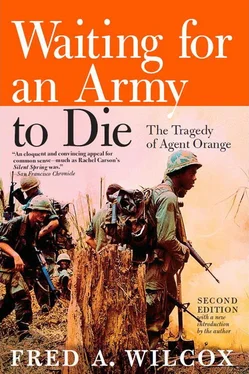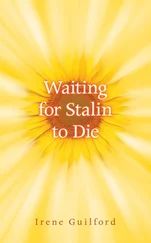Called as an expert witness at the Environmental Protection Agency’s 2,4,5-T suspension hearings, Dr. Gross said: “It appears that Vietnam veterans heavily exposed to herbicide Orange will carry low levels of TCDD in their body fat. This conclusion is supported by the observation that two of the three most heavily exposed men have the highest levels detected in this blind study. It is extremely unlikely that this finding is a matter of chance or has occurred because of herbicides or other TCDD-related exposure in the United States. Furthermore, 50 percent of the veterans of Vietnam tested in this study exhibited low levels of TCDD in their abdominal fat whereas only 20 percent of the controls were found to be positive.
“Additional support for this conclusion comes from the replicate analysis of the adipose samples from the ‘heavily exposed’ veterans, and from the validation analysis performed by Mr. Harless. We recognize the need for additional validation studies, and these are planned.
“We propose that the results are relevant to the cancellation hearings. They constitute support for the concept that exposure to TCDD can lead to long-term storage in human fat tissues.” 2
Dr. Gross’s discoveries seem to have been received by the VA with the same amount of enthusiasm that the Atomic Energy Commission displayed when informed by John Gofman and other researchers that long-term exposure to low-level radiation could be dangerous, even deadly. In the two years following Dr. Gross’s testimony at the EPA hearings, the Veterans Administration conducted no further tests to determine the extent to which Vietnam veterans may have TCDD in their fatty tissues. However, the VA recently announced that it does intend to conduct further studies on the adipose tissue of veterans.
Should he discover that the fatty tissue of veterans he has examined contain residues of TCDD, Codario will attempt to flush dioxin from their bodies with a drug used to treat victims of kepone poisoning. Kepone is an insecticide which, like dioxin, collects in the fatty tissues of the human body, producing numbness of the hands, headaches, personality changes, and other dioxin-like symptoms. Another similarity between kepone and dioxin is that it is eliminated in the bile fluid, passed into the intestine, and then reabsorbed in the body in what physicians call an enterohepatic cycle. At the University of Virginia, a researcher administering cholestyramine (a bile-salt binder commonly used to treat patients with elevated levels of cholesterol and, in some cases, jaundice) to workers who had high levels of kepone in their bodies discovered that within two months all of the workers showed dramatic improvements, and within one year seven of the twenty-two workers were totally kepone free. The results were published in The New England Journal of Medicine (1978, vol. 298) by Dr. Philip S. Guzelian et al., and Codario believes that Guzelain’s findings may be vital to physicians working with Vietnam veterans or victims of domestic herbicide spraying.
“So if dioxin behaves similarly to kepone, and we have evidence that it does,” says Codario, “it would certainly be tempting to postulate that it could be eliminated from the body by the aid of cholestyramine. And so, once I get the fat biopsies back, I can start giving my patients this drug and doing follow-up examinations to measure for dioxin in their bowel movements. In that manner I can determine if TCDD is actually being washed from their bodies.”
Ronald A. Codario seems to find nothing unusual about the fact that he is doing work that should have been done years ago by the Veterans Administration, or that, without a grant from any of the national health institutes or foundations, he has discovered a medical basis for proving that Vietnam veterans were exposed to Agent Orange and that their exposure is now crippling and killing them. As a specialist in internal medicine he could demand fifty dollars an hour for his advice, yet he donates twenty to thirty hours each week to people whom many Americans still prefer to use as scapegoats for the Vietnam War.
Will the Veterans Administration listen to his theories, accept his statistics, and take action of behalf of Vietnam veterans? Codario thinks they will. He believes that the men and women who run the VA are honest people who are stifled by the inherent inefficiency of big government; moreover, he intensely dislikes what he calls “Monday morning quarterbacking,” and says that trying to place blame for what has happened to Vietnam veterans will only prolong their agony.
“Look,” he says, shuffling a stack of papers on his desk, “it’s just too easy if you ask me to say, ‘Hey, Dow did this, and the VA did that.’ Sure, maybe there was conflict of interest back then, and we all know that somebody makes, or rather made, a lot of money from selling herbicides. But it’s just too easy, if you ask me, to look back fourteen years and place the blame. That just isn’t the thrust of my work. I’m just trying to show that these fellas have a problem, and I want to get them some help. And in getting help for them I want to say, ‘Hey, listen, these things have caused the problems.’ Let’s just make sure it doesn’t happen again because certainly the people that can help the veterans much quicker than I can are the federal government and the chemical companies. I think that where we have to exercise our diligence and care now is trying to make sure that mass herbicide spraying and pollution of the environment doesn’t continue to happen in the future.”
Codario and I shake hands and he walks me to the waiting room, where his receptionist and an elderly black woman are watching television. I ask directions to the subway, explaining that on my way to his office I had gotten off at the wrong stop. Codario, the elderly woman, and the receptionist appear shocked that I would have taken the subway, and insist on calling a cab. During the drive to the train station, the cab driver chats pleasantly, weaving skillfully in and out of the rush-hour traffic and laughing happily at his own jokes. But I am mesmerized by the clicking meter and unable to put out of my mind what Codario said as I was about to leave. The Green Beret, he told me, has continued to deteriorate. His liver and spleen are swollen, his arms and legs are often numb, and he has lost much of his coordination. Rising from a chair or sofa, he often falls down, walks into walls, stumbles about the room. He has episodes in which he goes blind for fifteen minutes, and has lost consciousness while driving, ramming into the car in front of him. Sometimes he “goes off” for a couple of days, flying into terrible rages, banging his hands through walls. X-rays have failed to determine why his urine is darkened and his head throbs and he has blood in his bowel movements.
As I pay the driver and prepare to enter the station, I remember something else Codario told me about the first Vietnam veteran to enter his office complaining of “bizarre” and “exotic” symptoms. The man’s wife, said Codario, had given birth to a horribly deformed baby girl who died in the veteran’s arms.
9. Humans, Rats, and Lesser Beings
On one wall of the receptionist’s office at the Oregon Regional Primate Research Center in Portland a large female monkey and her baby snuggle beneath the caption LOVE US OR LOSE US. On the opposite wall a sullen great ape informs visitors that AROUND HERE WE CAN USE ALL THE SMILES WE CAN GET. After checking the appointment roster and handing me a name tag (NO ACCESS TO ANIMAL ROOMS), the receptionist suggests I wait in the center’s cafeteria. Fifteen minutes late Dr. Wilbur McNulty, whose research into the effects of TCDD-dioxin of rhesus monkeys has often been quoted by opponents of domestic herbicide use, appears. Thin and polite, he answers my questions with the cautious reserve of a scientist who has been drawn, somewhat against his will, into the controversy over dioxin.
Читать дальше











